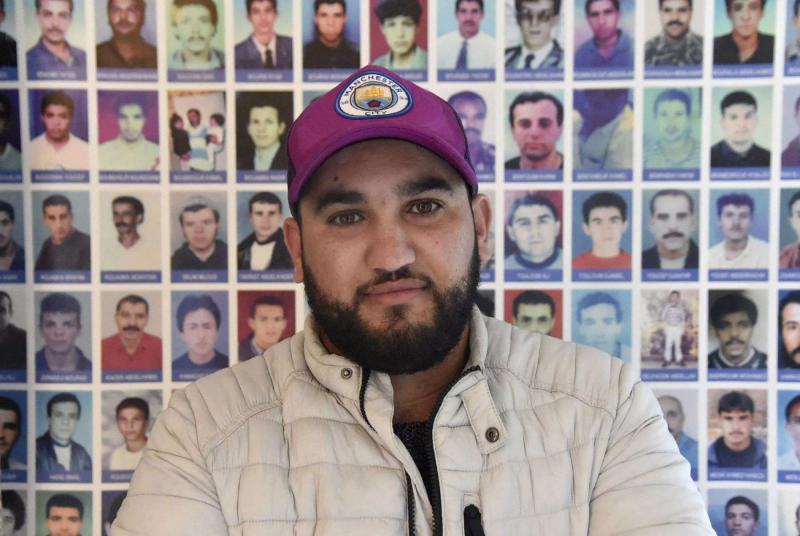176
 |
| Zaki Hannache, a 32-year-old Algerian activist, poses at the headquarters of the SOS Disparus Association in Algiers, February 13, 2021. (AFP) |
One afternoon in mid-February, Algerian activist Zaki Hannache was arrested in front of his family home.
Police confiscated his phone and took him away.
Hannache, a prominent activist within Algeria’s pro-democracy Hirak movement, was jailed on a string of charges, including defending terrorist acts.
He became one of the hundreds of Algeria’s prisoners of conscience.
Hundreds of citizens have been jailed for trying to keep alive the Hirak movement that held weekly pro-democracy protests starting in 2019, leading to the downfall of long-time Algerian President Abdelaziz Bouteflika.
The marches were banned last year by the nation’s army-backed government.
Authorities then expanded their sweep, linking some Hirak supporters to two groups added to Algeria’s terror list last year: Rachad, regarded as Islamist infiltrators whose leaders are in Europe, and MAK, a separatist movement in Kabylie, home of the Berbers.
“During the last two or three years, there have been thousands of lawsuits against activists,” said well-known Algerian lawyer Mustapha Bouchachi.
“The only mistake that has been made is that they have expressed their political opinion on social networks,” he added.
For human rights groups, Hannache and others are victims of an unjust, antiquated system of governance that views dissidents, or simply critical voices, as criminals.
They say that Algerian authorities use threats to national security to stifle free speech, including amongst journalists, and justify arrests.
For authorities of the gas-rich North African nation, guaranteeing the stability of the state is at the heart of their actions.
A campaign on social media, with the hashtag #PasUnCrime (not a crime), was launched on May 19 by dozens of NGOs against the repression of human rights.
The U.S. State Department’s 2021 country report on human rights in Algeria cited a long list of problems, including arbitrary arrests and detention and restrictions on freedom of expression, assembly and association.
In March, the U.N. High Commissioner for Human Rights, Michelle Bachelet, asked Algeria to “change direction” to “guarantee the right of its people to freedom of expression, association and peaceful reunion.”
Mohamed Farhaoui, a local resident in Algiers, told the AP that “everything” must be changed.
“We have to change everything about Algerian politics,” he said.
“President (Abdelmadjid) Tebboune must insist on that, even the parliament and the communes. All must be changed, we have to give young people a chance.”
President Tebboune recently launched an ill-defined initiative dubbed “outstretched hands,” described as an “internal front” to promote dialogue across all sectors of society.
Army chief Said Chengriha suggested in several speeches that it is also to counter Algeria’s perceived enemies.
The initiative precedes July 5 celebrations of the 60th anniversary of Algerian independence from France, won after a brutal 7-year war.
“No one can refuse” to take part in this initiative, said Abou El Fadl Baadji, secretary-general of the National Liberation Front, once Algeria’s sole political party.
He was one of the officials Tebboune has recently consulted with on the subject.
People “wait with suspense the contents of this initiative … but we’re for this idea even before knowing the details,” said Baadji.
Additional sources • AP

